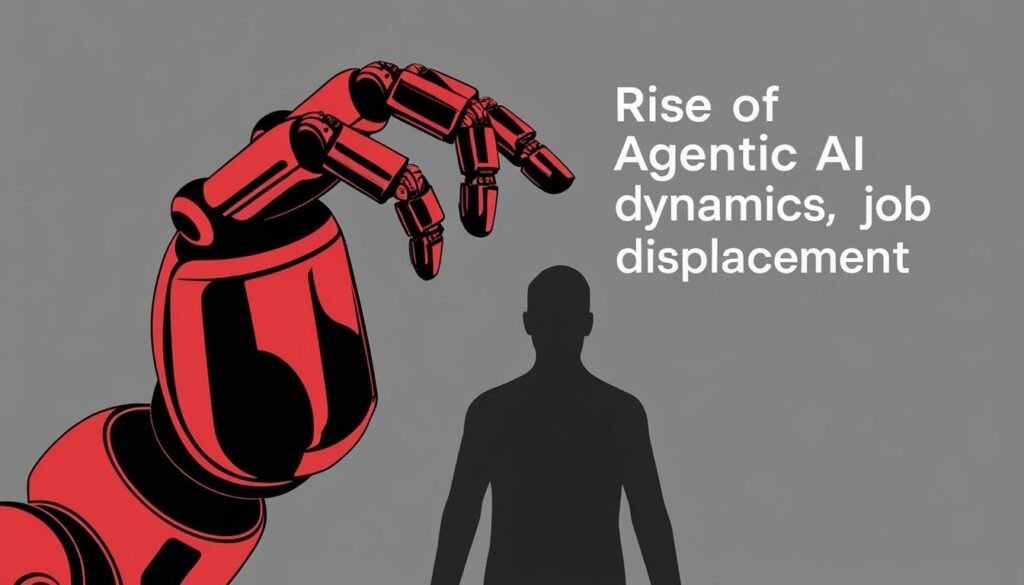Agentic AI represents a revolutionary shift in artificial intelligence, raising concerns over workforce implications and the potential for significant job displacement across various sectors.
The emergence of Agentic AI is heralding a significant transformation within the realm of artificial intelligence, particularly as businesses navigate its implications for the workforce and industry dynamics. While 2024 ushered in a focus on generative AI, which was celebrated for its potential to enhance human productivity and creativity, 2025 sees a marked shift toward a technology that operates autonomously, posing potential challenges to traditional job roles.
Agentic AI represents a radical departure from earlier AI systems, which typically required human input to function. This new generation of AI operates independently, characterised by its ability to optimise goals and execute tasks with incredible efficiency. With capabilities such as analysing vast data sets, recognising patterns, making independent decisions, and automating workflows, these systems are not just tools; they are seen as game-changers that can eliminate the need for human interaction entirely in various contexts.
For instance, in customer service, the era of scripted chatbots is rapidly evolving into a future where Agentic AI can discern customer intentions, anticipate needs, and resolve issues independently. “Imagine an AI agent proactively identifying a delayed delivery, notifying the customer, and offering compensation without any human intervention,” highlights the publication HRKatha, showcasing the potential consequences for employment in such sectors. The efficiency that these systems bring may be highly attractive to businesses, but it raises concerns for employees, especially those in customer service roles who may face substantial displacement.
The ramifications of Agentic AI reach beyond customer-facing roles, as middle management—the traditional core of corporate decision-making—finds itself increasingly vulnerable. These AI systems are not only capable of managing workflows but can also allocate resources and suggest strategic improvements, which diminishes the need for human oversight. The implications for organisations are profound: as reliance on AI-generated insights grows, the demand for human judgement may decline significantly, potentially leading to flattened organisational structures that create new economic realities for workers.
HRKatha points to a critical paradox facing organisations; while companies may seek to enhance profitability through automation, they must also consider the broader economic implications of mass job losses. Jobs are foundational to economic stability and consumer demand—eliminating roles without careful consideration could undermine the very markets that businesses depend on. If automation can facilitate a workforce reduction of up to 40 per cent, as some experts suggest, this shift poses serious questions regarding corporate ethics and sustainability.
The question of job displacement extends to the potential erosion of the middle class, as increased automation could exacerbate inequality and social unrest. Organisations face the challenge of navigating this new landscape without compromising their workforce and the values that underpin society. The complexities of such transformation require a re-evaluation of how organisations approach workforce strategy, including reskilling initiatives and development programmes aimed at supporting displaced employees.
Furthermore, the ascent of Agentic AI underscores the importance of addressing broader socioeconomic challenges and redefining societal values in a technology-driven economy. This prompts an essential dialogue regarding the measurement of human contributions in a landscape where machines often outperform in terms of efficiency and productivity.
As firms integrate Agentic AI into their operations, they are urged to consider how the benefits of AI-driven efficiency can be equitably distributed, avoiding the widening of existing disparities. The decisions made in the present will have far-reaching effects on the future of work and society. The era of Agentic AI is unmistakably upon us, and its ramifications will resonate within every sector, prompting all stakeholders to reflect on how best to adapt to these changes as they unfold.
Source: Noah Wire Services
- https://www.endava.com/glossary/agentic-ai – Corroborates the definition and capabilities of Agentic AI, including its autonomy, decision-making, and adaptability.
- https://www.endava.com/glossary/agentic-ai – Supports the distinction between Agentic AI and traditional AI, highlighting Agentic AI’s ability to operate autonomously and make decisions based on complex contexts.
- https://multiqos.com/blogs/what-you-need-to-know-about-agentic-ai/ – Discusses the impact of Agentic AI on the future of work, including its role in workplace automation and decision-making, and the projected growth of the AI market.
- https://www.cxtoday.com/contact-centre/what-is-agentic-ai/ – Explains the key characteristics of Agentic AI, such as independence, goal orientation, adaptability, and collaboration, particularly in customer service contexts.
- https://aisera.com/blog/agentic-ai/ – Details the capabilities of Agentic AI, including dynamic learning, decision-making, and interaction within complex environments, and its potential to optimize workflows and reduce operational costs.
- https://www.cxtoday.com/contact-centre/what-is-agentic-ai/ – Highlights the application of Agentic AI in customer service, such as delivering personalized interactions, proactive engagement, and resolving issues independently.
- https://multiqos.com/blogs/what-you-need-to-know-about-agentic-ai/ – Mentions the potential displacement of jobs due to Agentic AI and the need for businesses to consider the broader economic implications of automation.
- https://www.endava.com/glossary/agentic-ai – Supports the idea that Agentic AI can manage workflows, allocate resources, and suggest strategic improvements, reducing the need for human oversight.
- https://aisera.com/blog/agentic-ai/ – Discusses the importance of addressing socioeconomic challenges and redefining societal values in a technology-driven economy with the rise of Agentic AI.
- https://www.cxtoday.com/contact-centre/what-is-agentic-ai/ – Emphasizes the need for organisations to re-evaluate their workforce strategy, including reskilling initiatives and development programs, in response to Agentic AI integration.
- https://multiqos.com/blogs/what-you-need-to-know-about-agentic-ai/ – Underlines the importance of equitably distributing the benefits of AI-driven efficiency to avoid widening existing disparities as firms integrate Agentic AI into their operations.
















